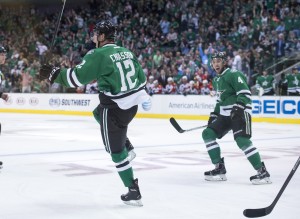Ups and downs are expected in an 82-game season. There will be extreme highs and extreme lows. Seasons tend to feel like a seven month long roller coaster ride for most teams, and the Dallas Stars are no different.
There were many emotional waves for the Stars this season, such as the retirement of Mike Modano’s number and the incident with Rich Peverley. These extreme ups and downs can happen in a span of weeks, games or even seconds. For a team like the Stars with so many new pieces on and off the ice and such a young core, the topsy turvy nature of the season is far from a surprise.
Inconsistency is expected as the team grows and learns together. Each new experience plants a step toward a brighter future. For a team that was mostly written off before the season began, the Stars have put themselves in a position to earn their first trip to the playoffs in six seasons. In order to get there, however, they will need to solve some inconsistency that has plagued the team most of the season.
Inconsistency Beyond the Record
The inconsistency refers to more than just Dallas’ record this season. The Stars faced inconsistency in special teams, depth scoring, goaltending, energy and general play. Throughout the season, it seems like in one game, the Stars would play strong team defense and responsible puck possession and speed, but sometimes they followed that up with a game full of turnovers, sluggish play and defensive errors. Just over the past five games, the Stars have started strong, taken a big step back in the second period and had mixed results in the third. Inconsistency forces the Stars to battle themselves as well as their opponents, which can be a kiss of death with the season winding down.
A look into Dallas’ record this season shows the turmoil of inconsistency. It seemed like all season long the Stars would find a way to get a big win and follow it up with a big loss soon after. Looking back at the schedule, the feeling wasn’t that far off. Six times this season, the Stars followed up a victory with a loss by three goals or more. They followed a loss with a win by three goals or more nine times this season. Combine them and that is 15 games in which the Stars had a complete turnaround for better or worse in the span of two games.
The Effects of Offensive Inconsistency
In terms of scoring, they won by four goals or more eight times this season, and the same goes for losses by four goals or more. The Stars ended up with 12 games this season in which they allowed five or more goals and 12 games in which they scored five or more goals. In the early part of the season, the Stars struggled defensively as they attempted to form chemistry and implement a new system. With two games left in the season, Dallas had allowed 35 shots or more in 19 games while registering 35 shots or more in 23 games. Only eight of those games overlapped, meaning both teams ended up with 35 shots or more. There was no overlap in games in which they allowed or took 40 shots or more. They allowed that many shots eight times and took more than 40 shots 10 times.

That means in 18 games this season, the Stars either pummeled the opposition or were trying to survive the pummeling themselves. With a new roster and system, it is no surprise that there are ups and downs, but the level of the extremities are what the Stars need to work on if they hope to make the playoffs and stand a fighting chance in the postseason.
These extreme ups and downs in shots and goals obviously led to inconsistency in wins and losses. The Stars had five winning streaks that lasted three games or more and three streaks of at least three consecutive losses. They failed to reach a four-game winning streak this season, but they had two separate losing streaks of at least four games each, with the longest being six games.
The Need for Consistent Secondary Scoring
Then, there is the inconsistency in secondary scoring. Tyler Seguin leads the team with 83 points and Jamie Benn is second with 77 points. There is a 36-point drop between Benn and the team’s third leading scorer, Alex Goligoski. The same goes for goals on the team. Benn is second on the team in goals, but he has more than the double the amount of the third-place Erik Cole. It’s clear that Benn and Seguin carry the Stars, but the secondary scoring needs to step up if there is any hope for the Dallas to make the playoffs and do well in the postseason.
http://youtu.be/QSBcicbt3k8
The Stars are 12-18-7 this season when Benn and Seguin fail to score a goal and 1-4-1 when they are the only ones to score a goal for the Stars. That is far from a winning recipe for the playoffs. The secondary scoring has picked up over the past 10 games, which bodes well if the Stars manage to punch their ticket to the playoffs.
Mental and Physical Ups and Downs
The best way to break down their inconsistency in energy this season can be shown through Dallas’ record in back-to-back games. If Dallas’ 13-12-1 doesn’t seem too troublesome, a 4-8-1 record in the second game of back-to-backs lends a glimpse into their play when the team is low on energy. For most of the season, the Stars start strong in the second game, but then they fall apart as their energy deteriorates late in the first period or during the second period.
Inconsistency in their play between conferences is puzzling this season. The Stars boast an impressive 26-13-9 record against Western Conference opponents, but their 13-17-2 record versus the Eastern Conference is the worst in the West. The good news is that Dallas’ final two games come against teams in their own conference.
Between the Pipes
As far as goaltending is concerned, Kari Lehtonen is statistically having one of his best seasons since arriving in Dallas. In fact, if Lehtonen wins the final two games of the season, he will tie his career-high of 34. One more shutout will give Lehtonen a career high of five, and his save percentage and goals against average are the second-best he’s had with the Stars. Lehtonen has been off a few times this season, but for the most part, he has been stellar. Back-up goaltending is where the inconsistency comes in.

Dan Ellis allowed one goal or less four times and four goals or more three times in 14 appearances with the Stars. Tim Thomas began his stint in Dallas with consecutive wins and two goals allowed on 36 shots. Since then, Thomas has lost four of his five appearances and allowed 18 goals on 117 shots.
The additions of Ellis and Thomas were supposed to allow Lehtonen to rest more often, but his 64 games played currently lead the league and are the third highest in his career. The Stars will lean heavily on Lehtonen to make the playoffs, and he will very likely start each game in the playoffs, barring an unforeseen circumstance.
Powerless Power Play
Dallas’ special teams have had their share of ups and downs this season, but the power play is arguably the biggest weakness this season. The Stars began the season with four power play goals in five games, but slumped to only three power play goals in the next 13 games. In that cold streak, Dallas’ three goals came on 47 opportunities. In January, the Stars registered a power play goal in eight straight games, but followed that up with two on 26 opportunities over the next seven games. They currently find themselves in another slump in which they have scored two power play goals in 27 opportunities over the past seven games.
Through the statistical peaks and valleys this season, the Stars have been able to put themselves in a playoff position with their fate in their own hands for the final two games of the season. Playoffs or not, the Stars have taken great strides toward a bright future with a talented young core this season. With just two games left to determine the whether or not Dallas’ playoff drought is finally broken, the Stars need to pull together with two solid, consistent outings for the playoffs, for the city and for each other.
Thank you!
This has caused an ever increasing availability of
imitation amber jewellery, sometimes passing as the real thing.
The amber found in any areas is characterized by how much succinic acid is in the organic mix and how many millions of years old the amber is.
and brush, and every time I do, I come back with piles of fur that his
body so desperately tries to get rid of.
You are allowed a lot more time period to pay back the credit.
If you want to understand Bad Credit Auto Loans and Personal Loans thoroughly you can visit her site If the link doesn’t work, just copy and paste in your browser.
Once you pay off debts and bills on time, you will greatly add valuable points to your credit score.